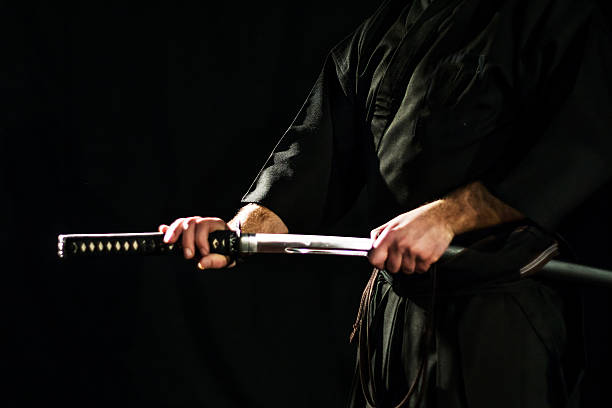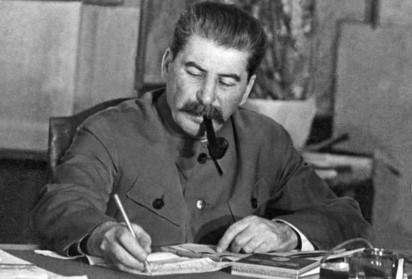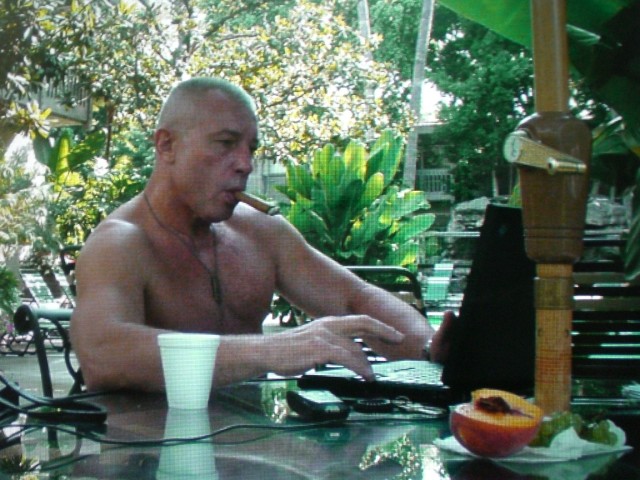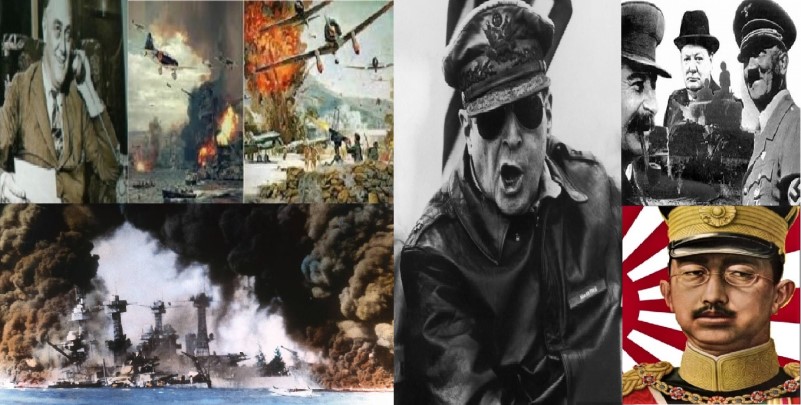On 26 November 1941, US President Franklin Roosevelt was awakened by a special late-night phone call. British Prime Minister Winston Churchill called with news of the utmost importance. The Gestapo intercepted the conversation between the President and the Prime Minister. After the war, the full text of the dialogue between the two leaders is kept in the German state archives. I found a copy of this radio intercept in the diaries of the Gestapo chief, General Muller, which were published in a very small edition, and I was fortunate enough to acquire it.
In that night’s conversation, Churchill informed Roosevelt that the Japanese flotilla of 6 aircraft carriers, 2 cruisers, and support ships had left the northern ports of Japan on 25 November and was heading for Hawaii in strict secrecy. The news did not shock Roosevelt, but he questioned the reliability of the information. Churchill assured Roosevelt that the information had come from several reliable sources and was solid. According to the information, the Japanese were planning to attack Pearl Harbor on 7 December 1941, 11 days later. Churchill went on to assure Roosevelt of his friendship, reminding him of Britain’s tragic situation and that the Japanese attack on the American base could be a point to secure Roosevelt’s approval from the US Congress to enter the war against Hitler, Japan’s military ally.
Roosevelt agreed with Churchill but expressed concern that if this information about the Japanese intentions reached the Pentagon, he, as Commander-in-Chief, would be obliged to order the Navy and Air Force to eliminate the threat of attack by preventing Japanese ships from approaching the islands. Churchill pleaded with Roosevelt to find a solution: “…we won’t survive on our little island, Franklin!”.
Roosevelt was silent for a while. Then he said this:
“…I think I can probably find an excuse to leave Washington while this crisis matures. After all, what I don’t know can’t be held against me, and after all, I too could misinterpret the message, especially from a distance…”.
Satisfied, Churchill bade his colleague good night and their conversation was over.
Two days after that night’s conversation, on 28 November 1941, Roosevelt left Washington for his home in Georgia. The sailors at the Pearl Harbor base were not disturbed by the President’s nightly phone calls. They had 10 nights more. On the morning of 7 December 1941 two thousand nine hundred and twenty-three American sailors would be killed and another eight hundred and seventy-nine would be wounded and maimed. Eighteen Navy ships would be sunk, burned, and disabled, and 188 US Air Force aircraft would be destroyed. The new aircraft carriers of the US Pacific Fleet would not be affected; they had been sent to American shores a few days before the attack.
By 7 December 1941, the American people would know where Pearl Harbor was, and their president would have his war.
DIABOLICAL DESIGN.
If you try to find a simple answer to the question of why Japan attacked the American naval base in Hawaii, you will get nowhere. The act of Japanese aggression committed in December 1941 will confuse the uninformed in the labyrinth of politics; after all, after a daring attack on the American military base, the Japanese air force and navy did not begin to develop success, did not begin to bomb American cities, blow up communications, and torpedo American ships. Japanese armies did not land on the American mainland. The action was not a declaration of war. After hitting an American military base, the Japanese war machine stopped and its ships went home to Japan. Did Japan’s leaders expect retaliation? Or did they expect America to surrender?

For the Japanese, hara-kiri, the ritual of spilling one’s guts, is a national custom. But it was sheer madness for the Emperor and his government to commit suicide on a national scale when Japan attacked Pearl Harbor and, a few years later, got two atomic bombs to be dropped on the heads of hundreds of thousands of Japanese. Indeed, on the face of it, there was no logic in the actions of the Japanese Emperor Hirohito in December 1941. But the East is a tricky place, the philosophy there is different.
The Second World War is the unfinished business of the First World War. The interests of the four parties clashed in a new struggle in which the aging imperialism of Britain was already ceding its position to the young and ambitious imperialism of America, and Hitler’s Third Reich, born on the ruins of the German Empire, was opposed to the imperial designs of the socialist Stalin, who had a plan to conquer the whole of Europe.
HITLER.
After the partition of Poland in the autumn of 1939, Hitler observed Stalin’s flirtations with the British and French. Analyzing intelligence reports and aerial photographs of the border areas of Poland, Hitler realized that a three-front war was being prepared for Germany, planning to attack it from the east, west, and north. To avoid the trap that Germany had fallen into in World War I, Hitler decided to strike first. From that moment on, as SS Major Heinz Linge recalled in his memoirs, ‘”the Führer stopped smiling…’”
Hitler decided first to restore order in the rear. In early May 1940, Wehrmacht troops invaded France from the north. France capitulated and German troops occupied it, Belgium, Holland, Denmark, and Luxembourg. The Wehrmacht drove the British out of Dunkirk and sent them home to the islands, where they were blockaded by German submarines. Britain and France who declared war on Germany were neutralized. The Germans also took control of friendly Norway, its iron ore and nickel, crucial raw materials for the war.
By the autumn of 1940, Hitler was bogged down in the war, his armies occupied every country in Europe and began operations in North Africa, targeting Arab oil and the Suez Canal.
Pondering how to pre-empt the insidious plans of Stalin, who was preparing his armies to invade and occupy all of Europe, Hitler devised the option of a quick war in which Stalin’s armies were to be defeated before winter set in. But the blitzkrieg failed for one simple reason. Neither Hitler, nor his marshals, nor the analysts of the General Staff realized that Russia was not Europe. Roadless roads, swamps, vast distances, rains, and thaws slowed the advance of German troops. And then came the Russian winter, for which the German armies were unprepared.
Imagine a tourist at the North Pole in slippers and shorts. This was the situation of the German soldiers in their light jackets, unprepared for the surprises of the Russian climate. Frostbite was more deadly to Wehrmacht troops than enemy bullets. The German soldiers who received an award for their participation in the campaign on the Eastern Front called it the ‘Order of Frozen Meat’. But that was at the front. In the rear of the Reich, the mood was different.

In November 1941, as the German armies froze near Moscow, their new empire stretched from the Atlantic Ocean in western France to Moscow in the east, from Norway in the north to Tunisia in North Africa, and across the Mediterranean. On this map of the Third Reich’s victories and conquests, the remnants of Stalin’s armies, which had lost millions of soldiers in retreat and had been driven into the Russian countryside, looked unconvincing and seemed to the Führer a trifle unworthy of special attention. For him, victory in the East was a matter of months. But Hitler was no visionary. He could not have foreseen what Japan and America had in store for him. Nor could anyone else.
At that moment, which did not seem critical, his colleague, Propaganda Minister Joseph Goebbels, was more far-sighted. He suggested to the Führer that he should announce a total mobilization and concentrate all German forces in Russia to deal a decisive blow. Hitler appreciated Goebbels’s oratorical skills, calling him “a giant in a dwarf’s body”. But when it came to military strategy, Hitler was jealously independent and took no advice from anyone. This fatal trait once brought him to the pinnacle of power and he believed in his genius: Poland was defeated in 4 weeks, France in 6 weeks, Holland in 5 days, Belgium in 17 days, Denmark and Norway in two months, Yugoslavia in 11 days, Greece in 3 weeks. There was a giddy sense of success.
In this atmosphere of jubilation, the sentimental Hitler pitied the feelings of the Germans and disregarded Goebbels’ advice, arguing that he did not want to frighten the German people by announcing a total mobilization of the population.
Hitler did not urge Japan to strike at the back of his enemy Stalin, bleeding him in the war on two fronts and ending the war in Russia before the onset of winter. Japan was an ally of Germany in this struggle and a mere tool of Hitler’s eastern policy. But Hitler may not have realized that Japan was an empire and, seeing himself as the master of the Pacific, jealously tolerated the presence of the American navy there. Hitler may have not understood the peculiarities of the mentality of his ally on the other side of the planet. Japan’s imperial ambitions did a disservice to him.

STALIN.
The critical situation in which the Soviet Union found itself in the autumn of 1941 forced Stalin to evacuate industry and administration to the interior.
In the event of defeat and the surrender of Moscow to the Germans, the Russians were left to build up their military strength beyond the Urals to retaliate. In a last desperate attempt to stop Hitler’s advance, Stalin tried to defeat the Germans with manpower. Stalin was not a professional military man, he was a burglar, and he learned the basics of political education in prisons, where he socialized with political prisoners. This mixture of banditry and Marxism made him a ruthless dictator whose calculations of human life were only raw material for the implementation of his plans. Once in power, he physically eliminated all his teachers, especially Lenin and Trotsky, as well as dozens of those who had witnessed his dark past. Unlike the Russian Suvorov, who had been a military commander in the Romanov Empire and whose strategy was to fight with skill rather than numbers, the Georgian Stalin decided to defeat the Germans with numbers. He recruited new armies and stacked German trenches with tens of thousands of corpses, while his fanatical field commanders drove crowds of unarmed men to capture German tanks with their bare hands, while industry prepared weapons for them. This was the kind of war the Germans had not expected.
The German machine-gunners who fired on these endless hordes suffered such psychological trauma that they were sent to hospitals for long-term treatment.
Stalin’s armies dug into the frozen ground around Moscow. Civilians dug trenches that became the graves of thousands of Russian women and old men. Troops were ordered not to retreat, and special Chekist detachments cheered them on with machine-gun blasts into their backs. Unprecedented frost stopped German equipment and froze the Germans themselves. But for the Russians, the frost was a savior. And they built up their forces: new divisions arrived near Moscow from the east and Siberia.

CHURCHILL.
Britain was shut out of the war, its army was trapped on the islands. Churchill paced himself, drank cognac, smoked cigars, and begged America for help. Hitler’s Admiral Denitz’s submarines blocked all the island nation’s waterways, cutting off sources of raw materials for Britain’s war industry and sinking supply ships sent by America. In Britain, brass fences of royal palaces, wires, cables, and anything else containing non-ferrous metal were cut off to make bullet casings and cartridges. England was under siege and played no decisive role in the war. Its economy was close to bankruptcy at the time.
ROOSEVELT.
America, not bound by military obligations to the countries of Europe, was far removed from the European drama and was helping Hitler’s opponents only materially by sending its supply ships to England and the Soviet Union. But half of the ships were sunk by German submarines, and overall this aid did not turn the tide of the war.
The Constitution prevented Congress from authorizing the president to send the American army to Europe because Hitler was not attacking America. Roosevelt was looking for a way out of the situation.
In the situation by November 1941, Roosevelt realized that the only real power in Europe still opposing Hitler was Stalin and his armies. He also realized that if Japan stabbed the Soviet Union in the back, the Russians might not be able to withstand a two-front war.
Roosevelt clearly understood that with Hitler’s victory, the appearance on the political map of the world of a new empire, the Third Reich, would put a big cross on America’s ambitions. And soon he, the president of America, will have to extend his hand in Nazi salute at diplomatic receptions. And the Germans’ new secret weapon, the ballistic space missile being tested, will turn America into a colony of the Third Reich. Roosevelt had no choice but to continue to help Stalin and think of ways to distract the Japanese High Command from studying topographical maps of the Soviet Union’s eastern fringes. Roosevelt had to keep Japan out of the game. And in the end, he made a decision.
In a critical situation, when Japan was about to attack the USSR in the East according to Hitler’s plan, Roosevelt gave Japan an ultimatum, demanding that it withdraw its armies from China and break its military alliance with Hitler. He threatened Japan with political and economic sanctions and threatened to cut off its oil supplies. In essence, it was a provocation, a defiance.

HIROHITO.
Hitler’s ally, Emperor Hirohito of Japan, was encouraged by German success in Europe, but was in no hurry to attack the Soviet Union, remembering the recent crushing defeat of his army at Khalkhin-Gol in 1939.
After the German invasion of the USSR, Japan waited and calculated its advantages. While waiting, Japan received Roosevelt’s ultimatum. The Pacific had been an area of imperial interest to Japan for centuries. America’s ultimatum hurt Japan’s ambitions. The Emperor of Japan and his high command realized that they could not fulfill their obligations to Germany and attack the Soviet Union. After the first few days of the invasion, their fuel-poor planes would not take off, their cruisers would not move and their tanks would not roar. And that would be the end of the Empire of the Rising Sun. It will become the prey of millions of Chinese peasants. America’s ultimatum was a kick in the teeth for Japan. Like a little dog, it had been told where it belonged. The puppy decided to bite the offender. For the Japanese military, the key arguments in the decision to attack the Americans were the power of their navy and the hurt of imperial ambitions. So the Japanese decided to attack without informing their European ally. Japan decided to change the current military and political situation in the Pacific in its favor, to intimidate America as its ally Hitler had intimidated Europe.
Here it is, Asian cunning when Japan’s imperial ambitions helped not Hitler but all his enemies – Stalin, Roosevelt, Churchill. By attacking Pearl Harbor, Japan gave its ally a second front, turned the European war into a world war, and brought Germany closer to defeat.

COMMENT.
Half a century after the Japanese attack on Pearl Harbor, researchers have found evidence that American President Franklin Delano Roosevelt knew of the impending Japanese attack. He knew two weeks before the attack on the US naval base, and not only did he take no protective measures, he ensured that his military leaders did nothing to stop the Japanese from carrying out their dastardly plan. The new carriers were ordered to redeploy and left Hawaii for a reason. So, Roosevelt wanted an attack to happen.
By issuing an ultimatum to Japan, he realized that he was putting his country at risk of military conflict. Did he have an alternative, a different, less categorical decision?
Given the speed with which events were unfolding and the obvious threat of Soviet defeat, it is safe to assume that the US President did not have time to consider other diplomatic moves.
Elected for a third term, President Roosevelt promised his citizens that the American soldier would not take part in the carnage of the European war… unless the enemy attacked America first… Hidden in that ‘unless’ was the justification for his decision. Now that the enemy had attacked, Roosevelt could enjoy his Christmas turkey in peace. Which he did.
After the tragedy of Pearl Harbor, new events in that long-ago war and the post-war world have told us more about Roosevelt’s intentions than all the classified and declassified documents combined. Roosevelt was judged by his descendants many decades after his death. The descendants tacitly forgave their former president for the events of long ago, thus justifying his act against the people, but for the good of the people. A crime committed for the good of the people? But that is how you can justify Hitler, Stalin, Lenin, and many of today’s dictators, who sent millions to their deaths for the supposed happiness of future millions…
It was only after his death, two weeks before the signing of the German surrender, that the supreme commander of the Allied forces in Europe, General Eisenhower, had an epiphany. He said: ‘We’ve got the wrong fox. And he began to recruit specialists for the war against Bolshevism. 300,000 Germans came to America, specialists in every branch of the military. The Cold War with a former ally has begun. That hated America and stole its secrets. Who occupied half of Europe. And the naive Americans didn’t see it for a long time.
Roosevelt was a naïve socialist who helped Stalin industrialize Russia in the 1930s without realizing that Stalin was militarizing his country to invade Europe. Roosevelt did not just save Stalin’s camp communism with the Lend-Lease program. He saved the Evil Empire by putting nearly 4,000 American lives under Japanese bombs and bullets at Pearl Harbor to get an excuse to declare war on Germany, Italy, and Japan and make it World War II.
For that alone, the people of the USSR should declare 7 December a Day of Remembrance and Thanksgiving to America for the thousands of its boys and girls who gave their lives to save the future of others. But that’s unlikely; the rescued have short memories.
© Copyright: Walter Maria, 2014 Certificate of Publication #214031102197

Be First to Comment